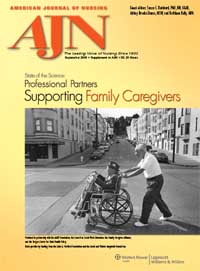When we talk about what we do at the Foundation, we often get asked, "What are you doing for caregivers?"
This puzzles me in two different ways. First, I need to figure out which of the many caregivers is meant: the family and friends who provide care to their loved ones, the direct care workers (aides and attendants) who provide the most hands-on, paid care, or the professionals (RNs, MDs, etc.) who, I hope, also see themselves as caregivers? Second I'm not quite sure what to say. The Foundation doesn't have many projects specifically focused on informal/family caregivers, but I think that all of our work benefits them as well as the older adults they love.

This became clearer to me last year, shortly after the release of the Foundation-sponsored special issue of the  American Journal of Nursingreporting on the "State of the Science: Professional Partners Supporting Family Caregiving," part of a project we have focused on family caregivers in collaboration with The AARP Foundation and The Family Caregiver Alliance.
American Journal of Nursingreporting on the "State of the Science: Professional Partners Supporting Family Caregiving," part of a project we have focused on family caregivers in collaboration with The AARP Foundation and The Family Caregiver Alliance.
I was at a meeting sponsored by CMS to announce the launch of their new Web site for family caregivers. http://www.medicare.gov/caregivers/ There was good discussion of the health problems caused by the strains of caregiving and some very interesting suggestions for special Medicare coverage for younger caregivers and "same appointment" protocols for assessing and treating caregivers when they bring their loved ones to health care providers so as to decrease the burden of multiple appointments. Because informal/family caregivers provide so much care and thereby reduce use of nursing homes and other more expensive options, it is in every one's interest to keep them healthy.
Other speakers bottom-lined the needs of family caregivers as "respite" care to provide time off and/or in home assistance (paid caregivers) to help with tasks that are just too much. If you are caring for someone with dementia who doesn't sleep at night or needs constant supervision to be safe, you may need respite care to get some time off. If you are caring for someone who is bed-bound and needs assistance to move from bed to chair or toilet and to be frequently repositioned to prevent bedsores, you probably need a "direct care worker" (a certified nursing assistant, personal care aide, or home care attendant) Right now, these services are not part of Medicare and only sporadically available according to geography, complex eligibility requirements, or ability to pay. You can learn more from our grantee, PHI (the Paraprofessional Healthcare Institute).
You can learn more from our grantee, PHI (the Paraprofessional Healthcare Institute).
All of this is true, but when I thought about the one thing that would have helped me the most in my limited caregiving career, what came to me was "quality geriatric care." If physicians and nurses delivered the right care at the right time, there would have been no need for extra appointments to address complications that never should have happened. If health care professionals made more skillful diagnoses of illness and prognosis, my loved one would have had better outcomes and I would have felt more in control. If physicians and hospitals and hospice agencies answered their telephones, knew about the patients in their care, and talked to each other and family members, how much less stressed and burdened would I have been?
One of the reason caregiving is so hard is that caregivers are asked to make up for the cracks and failings of the current system. AND WE SHOULD NOT HAVE TO.
As a once and future caregiver, my number one demand is better geriatric care!
